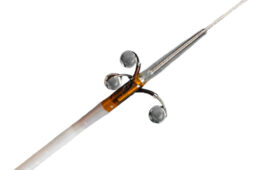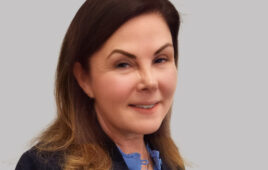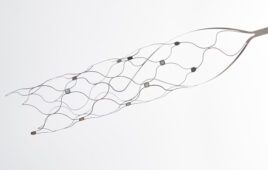
Laura Brand [Photo courtesy of Celanese]
She is responsible for delivering on the medical pipeline while focusing on growth opportunities in the Long Acting Dosage and Drug Delivery Device segments.
Laura joined Celanese in July 2020 from Amgen where she spent 11 years in roles of progressive commercial leadership, including responsibility for marketing, sales, lifecycle management and P&L in innovative oncology and biosimilars.
Prior to joining Amgen, Laura spent 10 years with the Boston Consulting Group, primarily focused on the biopharmaceutical industry. Laura has an MBA from the Wharton School in Marketing and Operations and a BA from the University of Wisconsin (Madison) in History and Journalism.
What first drew you to medtech? When did you first know you wanted to be in the industry?
Brand: Working in life sciences at my previous company, I was exposed to many innovative treatments that dramatically improved the lives of patients. But I also became aware of the challenges of drug delivery and ensuring the best patient experience and outcomes. At Celanese, I am very proud to play a role in optimizing drug delivery devices that are more sustainable and improve the overall patient experience.
What projects, past or present, have made you love what you do?
Brand: I am passionate about the medical segments my team covers: Medical Devices, Orthopedic implants and Long Acting Dosage drug eluting implants. We are focused on helping customers solve their most pressing issues. Developing more sustainable options and reducing their carbon footprint is one area where we have made significant headway. Continuing to pursue innovation in the orthopedic implants is another big area of interest. Our long-acting dosage business has massive potential to address patient adherence issues and improve patient outcomes
What projects are you most looking forward to?
Brand: In addition to those specific projects I mentioned above, I derive great satisfaction and motivation from seeing the end result of the devices and therapies we help facilitate–and the ways they can improve the lives of patients. When people living with medical conditions can spend less time as “a patient” and more time as themselves, that’s the real win.
What are some of the barriers women face in today’s medtech industry, if any?
Brand: I have been fortunate in my career that I have not encountered obstacles specific to being a woman. Women hold a number of senior leadership roles in management consulting, the life sciences sector, and at my current company, Celanese. We are fortunate to have a very talented, experienced woman as our CEO (Lori Ryerkerk). While many of the engineers with whom I work tend to be men, I bring a different perspective to the business, and gender has not impacted my ability to be effective.
Describe your biggest leadership challenge. How did you conquer it or resolve it, or what was the outcome?
Brand: I have been in several situations where I have been asked to lead a team where I don’t have the specific experience or expertise that many of the people on the team possess. As a district sales manager without much therapeutic area experience, I did a lot of listening and was very clear about the value I could bring (and not bring). Our team landed a first-place spot (important in sales), retained key at-risk employees, and I am still in touch with many of my team members almost a decade later. In my current role I brought medical experience, but did not have knowledge about polymers and their applications. Our team is successfully growing the business. Building a high-functioning team, actively listening and openly acknowledging vulnerabilities have been critical success factors in both examples.
Talk about your leadership skills. What is the most important lesson you have learned that has guided you in your career? The most important lesson I have learned is to be open to new opportunities that may not initially sound like the direction you were planning to take. Every experience offers new insights, and while it’s important to have long-term goals, don’t be too rigid on the journey to get there. Whatever path you choose needs to work for you holistically – not only from a career perspective, but also from a work/life balance outlook; and those needs can change over time. Another critical leadership skill is ruthless prioritization. There will always be work, but determining where to spend your time takes some practice.
In your opinion, what more can be done to promote greater participation of young women in the medtech industry today?
Brand: Since career ambitions start at a young age, it’s important to make young women aware of opportunities in the medtech industry — both the engineering and business opportunities. Many of these women have relatives or friends who are also patients who receive some sort of treatment for an ailment. Connecting at this fundamental level and describing how they can have an impact on patient lives and the evolution of med tech, as early as high school (speakers, conferences) and continuing through college and graduate school can promote greater participation of young women in the medtech industry.
Why is it important for companies to be more inclusive and have more women in charge?
Brand: Women bring a different perspective than men and have proven to be effective leaders. If the goal is to have a diverse workforce, it starts at the top. People want to see that senior leadership roles are achievable for them.




